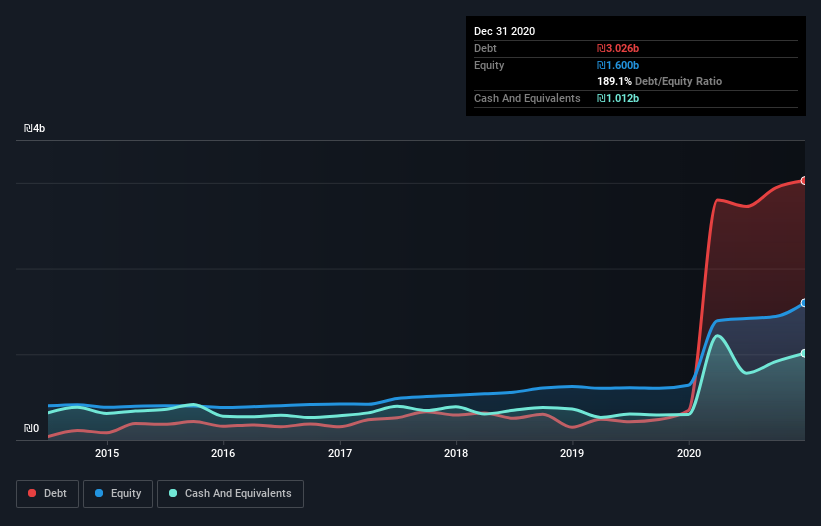David Iben put it well when he said, 'Volatility is not a risk we care about. What we care about is avoiding the permanent loss of capital.' It's only natural to consider a company's balance sheet when you examine how risky it is, since debt is often involved when a business collapses. We note that Lapidoth Capital Ltd (TLV:LAPD) does have debt on its balance sheet. But the real question is whether this debt is making the company risky.
Why Does Debt Bring Risk?
Generally speaking, debt only becomes a real problem when a company can't easily pay it off, either by raising capital or with its own cash flow. Ultimately, if the company can't fulfill its legal obligations to repay debt, shareholders could walk away with nothing. While that is not too common, we often do see indebted companies permanently diluting shareholders because lenders force them to raise capital at a distressed price. Having said that, the most common situation is where a company manages its debt reasonably well - and to its own advantage. When we examine debt levels, we first consider both cash and debt levels, together.
Check out our latest analysis for Lapidoth Capital
What Is Lapidoth Capital's Debt?
The image below, which you can click on for greater detail, shows that at December 2020 Lapidoth Capital had debt of ₪3.03b, up from ₪345.2m in one year. However, because it has a cash reserve of ₪1.01b, its net debt is less, at about ₪2.01b.

How Healthy Is Lapidoth Capital's Balance Sheet?
According to the last reported balance sheet, Lapidoth Capital had liabilities of ₪3.57b due within 12 months, and liabilities of ₪1.81b due beyond 12 months. Offsetting these obligations, it had cash of ₪1.01b as well as receivables valued at ₪1.48b due within 12 months. So it has liabilities totalling ₪2.89b more than its cash and near-term receivables, combined.
This deficit casts a shadow over the ₪1.83b company, like a colossus towering over mere mortals. So we'd watch its balance sheet closely, without a doubt. At the end of the day, Lapidoth Capital would probably need a major re-capitalization if its creditors were to demand repayment.
We measure a company's debt load relative to its earnings power by looking at its net debt divided by its earnings before interest, tax, depreciation, and amortization (EBITDA) and by calculating how easily its earnings before interest and tax (EBIT) cover its interest expense (interest cover). This way, we consider both the absolute quantum of the debt, as well as the interest rates paid on it.
As it happens Lapidoth Capital has a fairly concerning net debt to EBITDA ratio of 6.6 but very strong interest coverage of 1k. So either it has access to very cheap long term debt or that interest expense is going to grow! Notably, Lapidoth Capital's EBIT launched higher than Elon Musk, gaining a whopping 333% on last year. When analysing debt levels, the balance sheet is the obvious place to start. But you can't view debt in total isolation; since Lapidoth Capital will need earnings to service that debt. So when considering debt, it's definitely worth looking at the earnings trend. Click here for an interactive snapshot.
Finally, a company can only pay off debt with cold hard cash, not accounting profits. So we always check how much of that EBIT is translated into free cash flow. Over the most recent three years, Lapidoth Capital recorded free cash flow worth 57% of its EBIT, which is around normal, given free cash flow excludes interest and tax. This cold hard cash means it can reduce its debt when it wants to.
Our View
While Lapidoth Capital's net debt to EBITDA has us nervous. For example, its interest cover and EBIT growth rate give us some confidence in its ability to manage its debt. Taking the abovementioned factors together we do think Lapidoth Capital's debt poses some risks to the business. While that debt can boost returns, we think the company has enough leverage now. The balance sheet is clearly the area to focus on when you are analysing debt. But ultimately, every company can contain risks that exist outside of the balance sheet. Case in point: We've spotted 3 warning signs for Lapidoth Capital you should be aware of, and 1 of them is significant.
Of course, if you're the type of investor who prefers buying stocks without the burden of debt, then don't hesitate to discover our exclusive list of net cash growth stocks, today.
If you’re looking to trade a wide range of investments, open an account with the lowest-cost* platform trusted by professionals, Interactive Brokers. Their clients from over 200 countries and territories trade stocks, options, futures, forex, bonds and funds worldwide from a single integrated account. Promoted
New: AI Stock Screener & Alerts
Our new AI Stock Screener scans the market every day to uncover opportunities.
• Dividend Powerhouses (3%+ Yield)
• Undervalued Small Caps with Insider Buying
• High growth Tech and AI Companies
Or build your own from over 50 metrics.
This article by Simply Wall St is general in nature. It does not constitute a recommendation to buy or sell any stock, and does not take account of your objectives, or your financial situation. We aim to bring you long-term focused analysis driven by fundamental data. Note that our analysis may not factor in the latest price-sensitive company announcements or qualitative material. Simply Wall St has no position in any stocks mentioned.
*Interactive Brokers Rated Lowest Cost Broker by StockBrokers.com Annual Online Review 2020
Have feedback on this article? Concerned about the content? Get in touch with us directly. Alternatively, email editorial-team (at) simplywallst.com.
About TASE:LAPD
Lapidoth Capital
Provides drilling and related services in Israel, Romania, the United States, Poland, rest of Europe, and internationally.
Excellent balance sheet with proven track record.
Market Insights
Community Narratives



